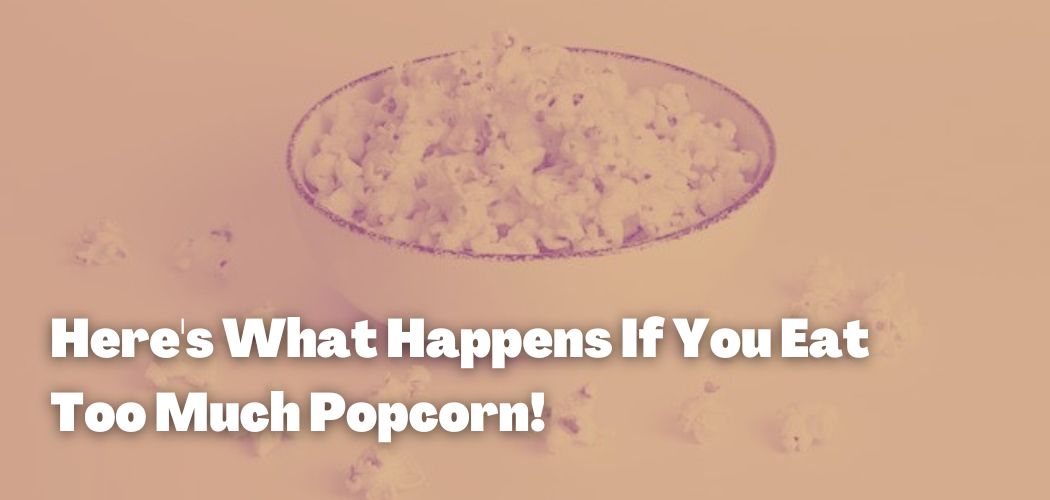Popcorn is a simple snack that may be purchased pre-popped in a bag, scooped from a machine, or microwaved in the comfort of your own home.
It is ideal for snacking at any time of day, and it is easy to consume by the handful without realizing it. They resemble potato chips in that you can’t eat just one!
Contents
Extremely High Fiber Content
Popcorn has a high fiber content. According to research, dietary fiber may reduce the risk of several diseases, including obesity, type 2 diabetes, and cardiovascular disease.
Additionally, fiber can aid in weight loss and enhance digestive health.

The recommended daily fiber intake for women is 25 grams, and for men, it is 38 grams. However, most people consume significantly less than that amount.
Popcorn has 15 grams of fiber per hundred grams (3.5 ounces), which is a significant portion of the daily fiber requirements.
Overconsumption Has Positive Health Effects
When ingested in excess, popcorn can provide numerous health benefits. Listed below are its possible health benefits.
Decrease Depression
Vitamin B3 in popcorn, also known as niacin, has been examined for its ability to help alleviate depression naturally, making popcorn a literal “comfort food.”
Intestinal Health
Due to the high amount of dietary fiber it contains, which encourages regular digestion and keeps one feeling full all day long, popcorn is good for the digestive system and tract.
It may even protect against colon cancer and is essential for a healthy heart. Popcorn’s high fiber content may facilitate the growth of healthy gut flora, which is needed not just for a healthy immune system but also for digestion.
Anti Aging
Popcorn has anti-aging properties. Free radicals are significantly more damaging than cancer.
They have been associated with a wide range of age-related symptoms, including wrinkles, age spots, macular degeneration and blindness, muscle weakness, cognitive decline, osteoporosis, Alzheimer’s disease, dementia, and hair loss.

Due to the potent antioxidants that battle the effects of free radicals, eating popcorn can keep a person feeling healthy and joyful far into old age.
Metabolism And Energy
Vitamin B is abundant in popcorn, particularly B6, B3, pantothenic acid, and folate. Vitamin B is vital for the regulation of many biological processes. The creation of energy and the metabolism of various nutrients are two examples.
Regulates Blood Glucose Levels
Dietary fiber also affects the body’s overall blood sugar levels. When the body is well-supplemented with fiber, it controls the release and regulation of insulin and blood sugar levels more effectively than in individuals with inadequate fiber intake.
Popcorn reduces blood sugar levels. Reducing these swings in blood sugar is a significant benefit for diabetic patients; hence, it is always suggested for diabetics.
Antioxidants
Yellow popcorn is rich in carotenoid antioxidants, such as lutein and zeaxanthin, which not only maintain eye health and may protect against age-related macular degeneration, but also counteract system-wide inflammation, which may be the root cause of chronic diseases.
Certain Disadvantages
Popcorn has many health benefits, but eating too much of it might have negative effects on your body. Several are listed below.
Weight Gain
The Center for Disease Control recommends selecting air-popped popcorn over kernels popped in fat, as this minimizes calorie consumption. There are 73 fewer calories in three cups of air-popped popcorn compared to oil-popped popcorn.
However, one cannot always control how popcorn is produced, especially when purchasing it at a movie theatre. In 2009, the nonprofit Center for Science in the Public Interest analyzed the popcorn provided by several of the nation’s largest movie theater chains.

Laboratory research revealed that some large servings of popcorn contained a staggering 1,200 calories and 60 grams of saturated fat. Extra toppings such as butter and sugar increase the number of calories and alter the nutritional content of the food, nullifying its health benefits.
Consuming an excessive amount of this sort of popcorn will lead to weight gain.
Enhanced Sodium
Consuming an excessive amount of popcorn with extra salt is likely to increase your sodium intake.
According to a renowned health clinic, people who are sensitive to sodium may experience fluid retention and elevated blood pressure, which can lead to renal disease, stroke, and heart disease.
In an assessment of movie theater popcorn, the Center for Science in the Public Interest discovered that some portions of big popcorn included 1,500 mg of salt, which is the recommended daily maximum for sodium for some individuals.
Rise In Cholesterol
Popcorn popped in saturated fat like coconut oil and then covered with additional buttery sauce is likely to raise blood cholesterol levels.
If popcorn is consumed in this manner on a regular basis, it increases the chance of developing atherosclerosis or other forms of heart disease due to cholesterol buildup.
Conclusion
It is a nutritious whole-grain snack loaded with fiber.
Is a supersized portion of popcorn OK once in a while? That partly depends on your other meals.
While you won’t have blown your calorie, fat, or sodium budgets, you’ll have consumed 124 grams of carbohydrates, which can be an issue if you’re trying to control your blood sugar.

